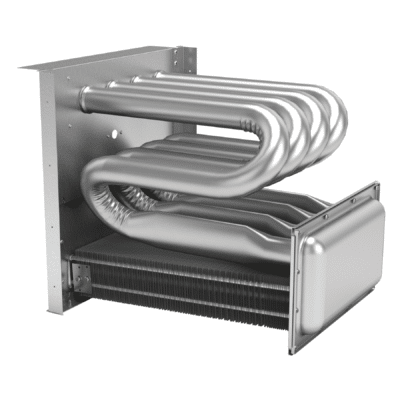Furnaces are essential to keep you warm and comfortable during the cold months. The furnace relies on a heat exchanger for maximum heat and clean air. Heat exchangers are by far the most important parts of the furnace. They are the component that gives you the advantage of a heated home without the dangers of inhaling any toxic gasses.
Most homeowners forget about them until a problem arises. Therefore, you need to understand what a heat exchanger is and how it works to ensure that you and your family are always safe from any fire hazards.
What Is a Heat Exchanger?
A heat exchanger is a metal device found inside the furnace, between the combustion chamber and blower. It helps transfer heat from the combustion chamber to your home via the heating ducts.
It also keeps you from carbon monoxide poisoning. There is a mixture of poisonous gases called “flue gases” in the combustion chamber that is not safe for you to inhale. The heat exchanger is responsible for keeping those gases in the combustion chamber.
The heat exchanger starts at the furnace’s burner assembly to the point where the chimney vents join with the furnace. Combined with a metal chamber, that passageway ensures that there is safe heat distribution throughout your house.
How Does a Heat Exchanger Work?
Once you turn on the furnace, the burners ignite and generate flames directed inside the heat exchanger. The combustion gases from the furnace’s burners get very hot, and as they flow through the heat exchanger, they heat their inside walls.
Since the heat exchanger is metallic, heating its inside walls is fast, and it also causes its outside to heat up. The return air ducts in your heating system then draw cold air from your home and blow it over the outside surface of the heat exchanger. The hot heat exchanger surface heats the air, and then, the air travels back through the air ducts into different parts of your house.
The combustion gases that remain in the heat exchanger are then expelled from the heat exchanger via a vent and outside the home. If you use a high-efficiency condensing furnace, the combustion gases pass through another heat exchanger, generating more heat for the house.
Problems With Heat Exchangers
One of the main issues that your heat exchanger runs into is metal fatigue. This happens because of the metal plate’s constant expansion (heating) and contraction (cooling).
This causes the metal to wear out and break at some point, which is why you should replace your heat exchanger after a certain period. Most heat exchangers last between 10 and 20 years. However, that could change depending on how well you take care of your furnace, how much you use it, and the brand you use. To extend the lifetime, ensure that you clean it regularly and use the furnace only when you must.
You should have a professional look at your furnace once or twice every year for regular maintenance. You should have them look for any holes or cracks in the heat exchanger to determine if there is any wear or tear. It would be best to do that before the cold seasons when you are about to use the furnace extensively. You may have to replace the heat exchanger or the whole furnace, depending on the damage.
Another major problem is improper installation of the furnace. Bad installation affects how much heat you get from the furnace and could also cause fire accidents. If you want to install a furnace in your home, ensure that you get in touch with the best company. Consider the skills level, experience, and reviews of their past customers. You also need to consider the brands of the products they use for the best quality during installation. You should also go for companies that are licensed to provide the services and who have liability insurance.
If you are in Meridian and need to install a furnace or schedule a maintenance or repair for your existing one, [company_name] is here to help you meet all your needs. We are a heating and air conditioning company dedicated to helping all our clients achieve the most comfort in their homes and commercial buildings all year long.
The HVAC services you can call us for include:
- Furnace installation and replacement
- Furnace repair
- Furnace maintenance
- Heat pump services
- Solar heating and water heaters
- Geothermal solutions
- HVAC inspections and ductless solutions
For more information or to book an appointment for any of our services, contact [company_name] on our customer care line 24/7.

